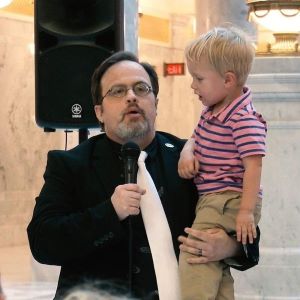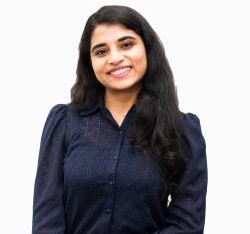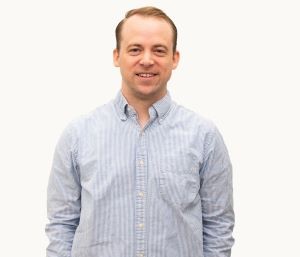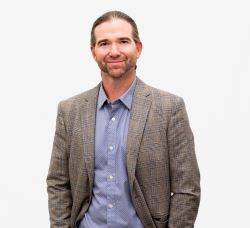Enter your email to receive the CareQuest newsletter:
July 9, 2024
As a filmmaker, Paul Gibbs tells other people’s stories for a living.
He didn’t know his own story — about trying to access oral health care — would have such a profound impact.
“My dental care experience turned out to be much more expensive, invasive, and painful than it needed to be,” Gibbs says. “And it was because while my doctors had recognized that oral health is part of the overall larger picture, my insurance didn’t.”
In 2009, Gibbs needed a kidney transplant because of ongoing issues. That transplant was covered by Medicare and Medicaid, but first he would need to get evaluated.

“The workup of my heart, lungs, brain, and everything else was covered by Medicare and Medicaid,” he says. “But they required a dental exam, which wasn’t covered.”
Through donations and help from friends and family, he was able to raise the funds for the exam and was eventually approved for the transplant. But the dentist found other issues Gibbs would have to take care of over the next few years.
“By the time I actually had dental insurance to get them dealt with, I had teeth literally falling apart in my mouth,” Gibbs says. “And when I was able to get dental care for some of them, I ended up having to have a couple of teeth extracted. One had become fused to the bone, and it was an extremely painful extraction.”
Gibbs’s story is unfortunately not a rare one. He and many others have shared their oral health care experiences with Utah Health Policy Project (UHPP), a health care policy and advocacy organization that focuses on physical, behavioral, and oral health care. UHPP, which receives funding from CareQuest Institute, is focused on ensuring there is a smooth rollout for the state’s Medicaid dental coverage this year.

“The vision and the mission of UHPP strongly resonates with what CareQuest Institute does,” says Pushyami Ajjarapu, oral health policy fellow at UHPP. “We see behavioral, oral, and general health all as a single entity.”
Earlier this year, UHPP formed the Oral Health Consumer Coalition Committee to get feedback from people who face barriers to accessing oral health care, like Gibbs. The group also passes along one-pagers to legislators on the significance oral health has to a healthy lifestyle, highlighting the need for accessible dental care and dental coverage.
“We try to hear the community’s voice — hear from them on how they are facing difficulties or finding it hard to find a dental provider, or get dental coverage, or know about the resources they have around them to get access to dental care,” says Ajjarapu.
The Push for Medicaid Dental Benefit Expansion in Utah
In 2023, UHPP was one of the organizations that supported a bill to expand the state’s Medicaid dental coverage to include all adults older than 21. Previously, only adults who were pregnant, were blind or had other disabilities, or were age 65 or older were eligible for those benefits. State lawmakers passed that bill into law, and implementation of the benefit expansion is expected to roll out this summer. That process won’t be simple, though, and UHPP wants to make sure individuals who will now be covered have the opportunity to speak up. Daniel Sloan, health policy analyst at UHPP, is helping to lead that effort.

“A lot of people in the group who attended [one of our meetings] were talking about how they’re on Medicaid or they have children,” says Sloan. “Some participants are concerned about their family being able to have access to good dental care. They want to be able to have an input in Utah’s policies, made by the state Medicaid program and by the legislature, on how to expand and access dental care in the state.”
Experiences from the committee members, like Gibbs’s, provide lawmakers with a better understanding of why the expansion of Medicaid dental benefits is so important. Matt Slonaker, the executive director of UHPP, emphasizes the need for two-way communication.

“The goal is to have a robust feedback loop from people facing real challenges,” he says, “especially looking at folks from underserved populations and being able to ensure that we can effectively communicate those challenges through whatever resources might move the needle.”
Encouraging Others to Tell Their Stories
Gibbs’s own experience with dental insurance has led him to want to help others in similar situations.
“My role is largely to help organize the committee, finding people who have these kinds of stories and these kinds of experiences . . . and discussing what the barriers are to oral health care and what we might be able to do to help with that,” he says.
UHPP team members say they were inspired to create the committee from the work of Federally Qualified Health Centers, which are required to have consumer advisory boards. Ajjarapu created flyers and bookmarks to spread the word about the committee and encourage people to tell their own personal stories, with the help of health access assisters (HAAs) at Take Care Utah (TCU).
UHPP houses TCU, a program that helps Utahns access health insurance coverage and navigate the health care system. TCU has more than 30 HAAs who provide one-on-one services virtually or in-person throughout Utah. Those HAAs can (1) provide application assistance in multiple languages for Medicaid, CHIP, or Marketplace; (2) conduct case management throughout the eligibility process; (3) provide guidance in selecting health plans; (4) provide insurance literacy education after enrollment to ensure benefits can be accessed; and (5) provide ongoing assistance with renewals or reviews to maintain coverage.
“The HAAs can share information about the committee to those patients, and they'll connect them with me,” Ajjarapu says. “And I can share resources with those patients, like finding them coverage options or looking into which dental clinics or providers accept their current coverage, and ask them about their interest in being on the committee. Many are hesitant to be on the committee and come to the office. But there are a few people who agree, and we are lucky to have them on the committee right now.”
Gibbs says sharing his own story gives him credibility and can help others who may be nervous to share their personal experiences. And the goal is to have those stories shape the future of oral health care in Utah.
“People are obviously far more willing to be vulnerable around somebody who treats them well and who genuinely respects them, and I really do have a lot of respect for anybody who is willing to make that kind of sacrifice and put themselves on the line to help with something this important,” Gibbs says. “And the people who are willing to do it have a strong desire to make a difference, and that’s really what it comes down to — finding the right people who really care about making a change.”